Refine search
Actions for selected content:
23990 results in Ancient history
4 - Rome across the Adriatic in the late Republic (167–59 BC)
-
- Book:
- Illyricum in Roman Politics, 229 BC–AD 68
- Published online:
- 05 May 2010
- Print publication:
- 21 January 2010, pp 61-79
-
- Chapter
- Export citation
17 - Tacitus and political thought in early modern Europe, c. 1530-c. 1640
- from Part IV - Transmission
-
-
- Book:
- The Cambridge Companion to Tacitus
- Published online:
- 28 March 2010
- Print publication:
- 21 January 2010, pp 253-268
-
- Chapter
- Export citation
16 - From manuscript to print
- from Part IV - Transmission
-
-
- Book:
- The Cambridge Companion to Tacitus
- Published online:
- 28 March 2010
- Print publication:
- 21 January 2010, pp 241-252
-
- Chapter
- Export citation
4 - The Germania as literary text
- from Part II - Texts
-
-
- Book:
- The Cambridge Companion to Tacitus
- Published online:
- 28 March 2010
- Print publication:
- 21 January 2010, pp 59-72
-
- Chapter
- Export citation
Index
-
- Book:
- Illyricum in Roman Politics, 229 BC–AD 68
- Published online:
- 05 May 2010
- Print publication:
- 21 January 2010, pp 219-223
-
- Chapter
- Export citation
21 - Tacitus’ Syme
- from Part IV - Transmission
-
-
- Book:
- The Cambridge Companion to Tacitus
- Published online:
- 28 March 2010
- Print publication:
- 21 January 2010, pp 317-329
-
- Chapter
- Export citation
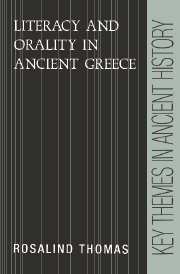
Literacy and Orality in Ancient Greece
-
- Published online:
- 18 January 2010
- Print publication:
- 25 September 1992
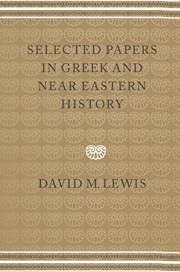
Selected Papers in Greek and Near Eastern History
-
- Published online:
- 15 January 2010
- Print publication:
- 03 November 1997
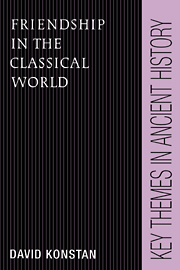
Friendship in the Classical World
-
- Published online:
- 14 January 2010
- Print publication:
- 06 February 1997
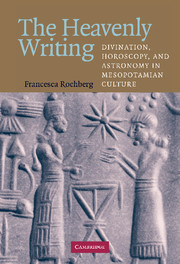
The Heavenly Writing
- Divination, Horoscopy, and Astronomy in Mesopotamian Culture
-
- Published online:
- 08 January 2010
- Print publication:
- 27 September 2004
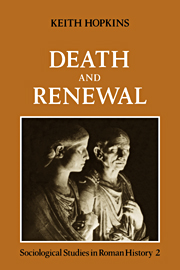
Death and Renewal
- Sociological Studies in Roman History
-
- Published online:
- 08 January 2010
- Print publication:
- 26 May 1983
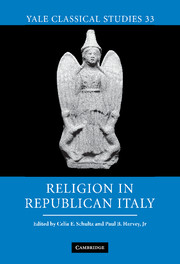
Religion in Republican Italy
-
- Published online:
- 08 January 2010
- Print publication:
- 14 December 2006
5 - Civic amnesia and legal memory: to remember and forget in the lawcourts
- from PART III - TIME, MEMORY, REPRODUCTION: LAW'S PAST AND FUTURE
-
- Book:
- Law's Cosmos
- Published online:
- 07 September 2010
- Print publication:
- 07 January 2010, pp 201-242
-
- Chapter
- Export citation
Preface: before the law
-
- Book:
- Law's Cosmos
- Published online:
- 07 September 2010
- Print publication:
- 07 January 2010, pp ix-xiv
-
- Chapter
- Export citation
Conclusion: the paradigmatic law
-
- Book:
- Law's Cosmos
- Published online:
- 07 September 2010
- Print publication:
- 07 January 2010, pp 287-316
-
- Chapter
- Export citation
Bibliography
-
- Book:
- Law's Cosmos
- Published online:
- 07 September 2010
- Print publication:
- 07 January 2010, pp 317-344
-
- Chapter
- Export citation
6 - Family/law: legal genealogies
- from PART III - TIME, MEMORY, REPRODUCTION: LAW'S PAST AND FUTURE
-
- Book:
- Law's Cosmos
- Published online:
- 07 September 2010
- Print publication:
- 07 January 2010, pp 243-286
-
- Chapter
- Export citation
PART I - THE BOUNDARIES OF LEGAL DISCOURSE
-
- Book:
- Law's Cosmos
- Published online:
- 07 September 2010
- Print publication:
- 07 January 2010, pp 19-20
-
- Chapter
- Export citation
Index locorum
-
- Book:
- Law's Cosmos
- Published online:
- 07 September 2010
- Print publication:
- 07 January 2010, pp 345-353
-
- Chapter
- Export citation
Introduction: the rhetoric of law
-
- Book:
- Law's Cosmos
- Published online:
- 07 September 2010
- Print publication:
- 07 January 2010, pp 1-18
-
- Chapter
- Export citation
